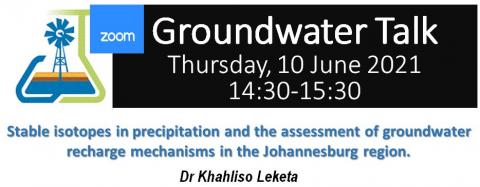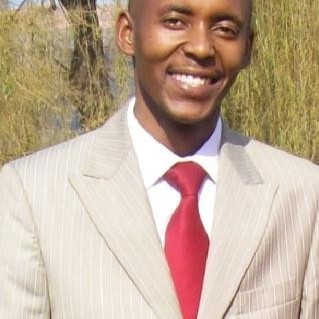GWD Talk: Stable isotopes in precipitation and the assessment of groundwater recharge mechanisms in the Johannesburg region (GAU)
Event description

About this event

Abstract
This study is about the assessment of the isotope signature of rainfall events between November 2016 and October 2018 in Johannesburg, South Africa.
Additionally, the study uses the Hybrid Single Particle Lagrangian Integrated Trajectory model (HYSPLIT) to assess the moisture sources and trajectories for rainfall events of extreme isotopic signatures. Also, the Johannesburg Local Meteoric Water Line (JLMWL) is used to identify direct and indirect groundwater recharge mechanisms in the Johannesburg region. The results indicate temperature and amount effects, however, with low coefficient of determination (R2) values of 0.21 and 0.12 for the respective effects. The rainfall with amounts of <20 mm yielded a meteoric water line (MWL) with a slope of +6.9 and deuterium excess (d-excess) of +11.9‰. Rainfall with amounts of ≥20 mm had slope and d-excess values of +8.2 and +18.6‰, respectively. The lower slope in rainfall of <20 mm indicated the preferential occurrence of sub-cloud re-evaporation on light rainfall. Considering the lack of re-evaporation in heavy rainfall (≥20 mm), its slope and d-excess were approximated to those of incoming or in-cloud moisture prior to condensation. Therefore, a high d-excess of +18.6‰ in incoming moisture indicates evaporation that mainly occurs under warm sea surface temperature and low relative humidity. HYSPLIT shows that the moisture for the most depleted and the most enriched rainfall originates in the higher latitudes but differ in their trajectory. The moisture for the most depleted rainfall had long residence in the higher latitudes following a semi-direct trajectory to Johannesburg, over the Atlantic and Indian Oceans. The most enriched rainfall followed a curved anticlockwise trajectory with long residence in the lower latitudes over the Indian Ocean leading to a loss of light isotopes, thereby, enhancing enrichment of moisture that moves further inland. This indicated the importance of atmospheric conditions along the trajectory on the signature of Johannesburg rainfall. The stable isotopes indicate direct recharge in the fractured quartzite aquifer in Johannesburg and indirect recharge from Hartbeespoort Dam through the Brits faults. The study further continues with an assessment of continental moisture circulation through the ongoing monitoring of stable isotopes in rainfall of Lesotho and Johannesburg.
Researcher Identity Numbers:
Speakers

Khahliso Leketa
Doctor Topic: Stable isotopes in precipitation and the assessment of groundwater recharge mechanisms in the Johannesburg region
Dr Khahliso Leketa obtained a Doctor of Philosophy at the University of the Witwatersrand (2019), a Master of Science and BSc Honours in Hydrogeology at the University of the Free State (2009 and 2011) and BSc at the National University of Lesotho (2008). After serving as a Senior Hydrogeologist at the Department of Water Affairs in Lesotho from 2011 to 2019, Dr Leketa is now a lecturer at the National University of Lesotho where he lectures and researches on water resources.
GWD Talk: Stable isotopes in precipitation and the assessment of groundwater recharge mechanisms in the Johannesburg region (GAU)
Can't find what you're looking for?
Get in touch with us and let us know how we can help